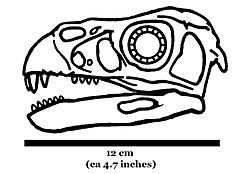Incisivosaurus facts for kids
Quick facts for kids IncisivosaurusTemporal range: Lower Cretaceous, 125 mya
|
|
|---|---|
 |
|
| Illustration of Incisivosaurus skull. | |
| Scientific classification | |
| Kingdom: | |
| Phylum: | |
| Class: | |
| Superorder: | |
| Order: | |
| Suborder: | |
| Infraorder: | |
| Genus: |
Incisivosaurus
Xu, Wang & Chang, 2002
|
| Species | |
|
|
Incisivosaurus ("incisor lizard") was a small theropod dinosaur. It probably ate plants, or maybe both plants and meat. This dinosaur lived about 125 million years ago. Its fossils were found in what is now the People's Republic of China.
The first fossil found was a skull. It came from the Yixian Formation in western Liaoning Province. This area is famous for its amazing dinosaur fossils.
What makes Incisivosaurus special are its front teeth. They look like the teeth of a rodent, like a mouse or a beaver! These teeth show signs of wear from eating plants. This is very unusual for a theropod dinosaur, as most theropods were meat-eaters.
About Incisivosaurus
When scientists first described Incisivosaurus, they looked closely at its skull. The skull was about 10 centimeters (4 inches) long. It had the most complete set of teeth ever found for an oviraptorosaur. Oviraptorosaurs were a group of bird-like dinosaurs.
Scientists believe Incisivosaurus was one of the earliest oviraptorosaurs. This means it was more "primitive" than dinosaurs like Caudipteryx and Oviraptor.
What it Looked Like
Incisivosaurus had some unique features.
- It had a long snout that was about half the length of its skull.
- Its lower jaw was thin and had a long opening called a fenestra.
- Its most famous feature was its large, flat front teeth. These teeth were like big incisors, similar to those of rodents.
Even with these special features, Incisivosaurus shared many traits with other oviraptorosaurs. This is why it is placed in that group.
Its Teeth and Diet
Most advanced oviraptorosaurs had no teeth at all. But Incisivosaurus had many teeth, which shows it was a very early member of the group. Some parts of its skull were also similar to therizinosaurs. Therizinosaurs were another group of theropod dinosaurs that likely ate plants.
In 2009, scientists used special scans to study the Incisivosaurus skull in 3D. They found that its skull bones had fewer bird-like air spaces than later oviraptorosaurs. They also discovered that Incisivosaurus had smaller smell parts of the brain. But it had larger sight parts, similar to ornithomimids. These features in oviraptorosaurs were similar to those found in birds.
Scientists think Incisivosaurus had feathers. Most other maniraptoran theropods, a group that includes birds, had feathers. Its total body length is estimated to have been just under 1 meter (3 feet). Some scientists wonder if Incisivosaurus might be the same species as Protarchaeopteryx. However, more fossils are needed to be sure.
Images for kids
See also
 In Spanish: Incisivosaurus gauthieri para niños
In Spanish: Incisivosaurus gauthieri para niños
 | James B. Knighten |
 | Azellia White |
 | Willa Brown |




